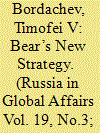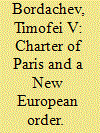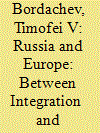| Srl | Item |
| 1 |
ID:
180796


|
|
|
| 2 |
ID:
178801


|
|
|
|
|
| Summary/Abstract |
The end of the Cold War opened up new vistas for building a new
international order in Europe, free of dividing lines. The more so since
the liberal world order, which emerged due to the evolution of the global
order in the field of security, on the one hand, and the rules, norms, and
practices established within the community of Western countries in 1945-
1991, on the other hand, was formally the most successful combination of
the effects of such categories as the balance of power and international
institutions. At the global level, this combination for a long time made
it possible to avoid revolutionary situations that might have been
caused by utter dissatisfaction of one or several major powers with their
position. However, in Europe, where the institutional basis of international interaction was most developed, the rules of the liberal world order
brought about significant distortions in favor of one of the participants
in this interaction—the European Union, which acted as an instrument for
increasing individual capabilities of major Western European countries.
This happened because the factor of military capabilities was excluded
from the overall balance of power of the main actors. Since for a long time
after the end of the Cold War Russia was limited in all factors of power
except for the military one, its position in relations with the EU was weak,
which is why its interests and values were ignored in building an EU-led
European order. This eventually paralyzed the entire system of multilateral
interaction in Europe, which, along with the shift of the global center of
power competition towards Asia, considerably marginalized the European
space in global affairs.
|
|
|
|
|
|
|
|
|
|
|
|
|
|
|
|
| 3 |
ID:
189824


|
|
|
|
|
| Summary/Abstract |
W
hat is the role of diplomacy in the crucial moments of
international politics? As a rule, diplomacy gives way to
the individual ability of leaders to objectively assess the
balance of power and make decisions on the basis of such assessments.
Filled with nostalgia, we look at the 19th century or the second half of
the Cold War era as the triumph of diplomatic art. But this was nothing
more than the result of the greatest stability ever in relations between
the key powers, which rested on the order recognized by all. But the
foundation of this order began to crumble due to the evolution of its
constituent living organisms—states, and then even the most advanced
diplomatic skills faced insurmountable difficulties.
|
|
|
|
|
|
|
|
|
|
|
|
|
|
|
|
| 4 |
ID:
172949


|
|
|
| 5 |
ID:
186778


|
|
|
| 6 |
ID:
163610


|
|
|
| 7 |
ID:
169562


|
|
|
|
|
| Summary/Abstract |
Russia and the European Union had all objective preconditions for establishing a lasting cooperative relationship, which could subsequently lead to integration. However, objective factors of their internal development and systemic changes in global politics resulted in a situation where such relations proved to be unclaimed for both parties.
|
|
|
|
|
|
|
|
|
|
|
|
|
|
|
|